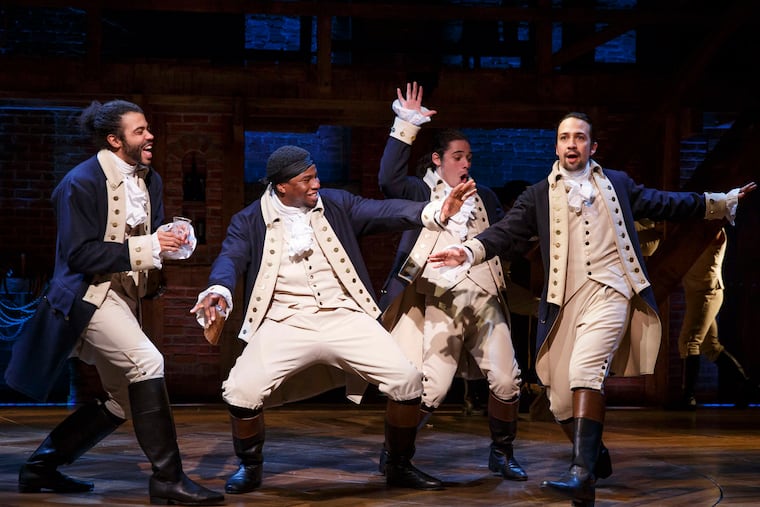Is Hamilton fever taking over the auction world?
Popular culture and the state of the economy have long driven the auction market, says Bill Panagopulos, president of Alexander Historical Auctions.

Popular culture and the state of the economy have long driven the auction market, says Bill Panagopulos, president of Alexander Historical Auctions.
These days, the popularity of the Broadway musical Hamilton and a heated election cycle have caused material from America's Revolutionary era to perform well on the auction block, he said.
A signature by Alexander Hamilton was valued at $750 and attracted a winning bid of $7,500, a tenfold rise, he said.
Alexander Historical Auctions will offer materials from this period for sale in Wilmington on Saturday.
Alasdair Nichol, vice chairman of Freeman's, the venerable Center City auction house, has also seen evidence of a Hamilton effect. "People are cognizant of it," he said. "It's making people think this will be the time to sell Hamilton material."
He cited a recent sale of a first edition of The Federalist Papers - Hamilton was one of three coauthors - that had been owned by William and Mary Scranton. The two-volume set with an inscription was estimated to sell for $60,000 to $90,000. It ended up going for $93,750.
While the 2008 recession hobbled U.S. auctions, the market for Americana seems to have recovered.
Printed and manuscript Americana auctions never broke $660,000 from 2008 to 2012, but every sale since then has beaten that level, said Rick Stattler, an Americana expert and director at New York-based Swann Galleries. "This year we held three general Americana auctions for the first time."
Technology has transformed the way people participate in auctions.
The internet and electronic bidding have greatly increased the bidder pool.
Opening up auctions to the wider world has also changed the nature of collecting. While fewer buyers now maintain large collections, more people are buying historic memorabilia at auction.
They typically collect anywhere from five to 25 pieces for decoration and tend to hold them longer.
Collecting has allowed even midsized auction houses such as Alexander Historical Auctions to serve international clients. Nearly 30 percent of the firm's revenue come from Australian, British, and French memorabilia, which draws customers from those nations. A buyer in Hong Kong recently paid $120,000 for a document signed by Mao Tse-tung.
Stattler noted that European buyers tend to focus on the Western frontier and Native Americans. Asian collectors have a preference for early American oceanic trade that touches on Asia.
The digitization and globalization of the market can create more opportunities for fraud. Panagopulos said he works with the FBI, National Archives, and the Department of Homeland Security to authenticate older materials and return stolen items to their proper owners.
Sotheby's was recently accused by Alexander Ivanov, a Russian billionaire and Fabergé egg collector, of advertising two fakes.
Sotheby's said it identified anomalies with both icons before they were sold and withdrew them. The auction house also announced the creation of a forensic unit led by a former FBI investigator to detect fraud.
"There's a lot of shadiness out there," Panagopulos said. "But after 30 years I think I have a pretty good read on what is and isn't authentic."
Panagopulos was a history buff long before he worked in the field. In 1992, after a 15-year career in the shipping business, he wanted to do something that channeled his passion for collecting Civil War-era autographs.
The result was Alexander Historical Auctions in Chesapeake City, Md., which helps buyers and sellers trade cataloged and authenticated memorabilia such as autographs, documents, and imprints.
The company now generates nearly $10 million in revenue a year, Panagopulos said. Clients include the Smithsonian Institution, the National Archives, the University of Michigan, and the University of Virginia.
When he first started, movies such as Glory, Gettysburg, and Ken Burns' documentaries on the American Civil War generated a surge in demand in material from that era.
Hamilton the musical seems to be playing a similar role, although fascination with the founding period runs deep. Benjamin L. Truesdale, Freeman's specialist in rare books, maps, and manuscripts, wrote that auction records of the last few decades "reveal a fascination with the foundation of the New Republic, which I suspect will likely be among us for years to come."
"Franklin materials are also in demand," he noted. A 1779 edition of his Political, Miscellaneous, and Philosophical Pieces was estimated at $2,500 to $4,000 during a Freeman's auction in September.
It fetched $5,938.
215-854-2507 @mannepalliaswin